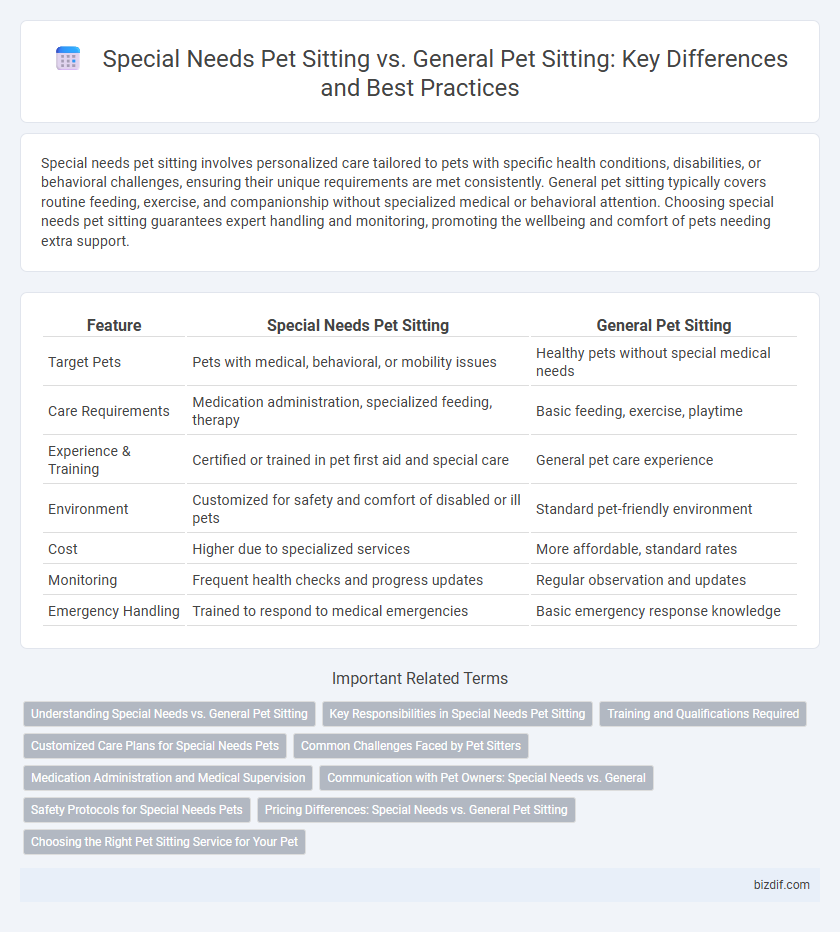Special needs pet sitting involves personalized care tailored to pets with specific health conditions, disabilities, or behavioral challenges, ensuring their unique requirements are met consistently. General pet sitting typically covers routine feeding, exercise, and companionship without specialized medical or behavioral attention. Choosing special needs pet sitting guarantees expert handling and monitoring, promoting the wellbeing and comfort of pets needing extra support.
Table of Comparison
| Feature | Special Needs Pet Sitting | General Pet Sitting |
|---|---|---|
| Target Pets | Pets with medical, behavioral, or mobility issues | Healthy pets without special medical needs |
| Care Requirements | Medication administration, specialized feeding, therapy | Basic feeding, exercise, playtime |
| Experience & Training | Certified or trained in pet first aid and special care | General pet care experience |
| Environment | Customized for safety and comfort of disabled or ill pets | Standard pet-friendly environment |
| Cost | Higher due to specialized services | More affordable, standard rates |
| Monitoring | Frequent health checks and progress updates | Regular observation and updates |
| Emergency Handling | Trained to respond to medical emergencies | Basic emergency response knowledge |
Understanding Special Needs vs. General Pet Sitting
Special needs pet sitting involves tailored care plans addressing chronic illnesses, mobility challenges, or behavioral issues, ensuring personalized attention and specialized medical administration. General pet sitting typically includes routine activities such as feeding, walking, and basic companionship for healthy pets without requiring specialized skills. Understanding these differences helps pet owners select appropriate services to meet their pets' specific health and lifestyle requirements.
Key Responsibilities in Special Needs Pet Sitting
Special needs pet sitting requires specialized knowledge in managing medical conditions, administering medications, and monitoring behavioral changes to ensure pets' well-being. Unlike general pet sitting, it involves close collaboration with veterinarians and adapting care routines to accommodate disabilities or chronic illnesses. Key responsibilities also include handling mobility assistance, dietary restrictions, and providing emotional support tailored to the unique requirements of each special needs animal.
Training and Qualifications Required
Special needs pet sitting demands advanced training in veterinary care, medication administration, and behavior management, unlike general pet sitting which typically requires basic animal care skills. Certified courses in pet first aid and specialized care for chronic conditions or disabilities are essential for professionals handling special needs pets. Expertise in recognizing signs of distress and tailoring daily routines to individual health requirements is critical to ensure safety and well-being.
Customized Care Plans for Special Needs Pets
Special needs pet sitting requires customized care plans tailored to the unique medical, dietary, and behavioral requirements of each pet, ensuring optimal comfort and safety. Unlike general pet sitting, which follows standard routines, specialized care incorporates medication administration, mobility assistance, and specialized feeding protocols. This personalized approach enhances the well-being and quality of life for pets with chronic illnesses, disabilities, or advanced age.
Common Challenges Faced by Pet Sitters
Special needs pet sitting involves unique challenges such as managing medical conditions, administering medications, and accommodating dietary restrictions, which require specialized knowledge and training beyond general pet sitting tasks. General pet sitting typically covers feeding, exercise, and companionship, but special needs pets demand closer observation for signs of distress or illness. Pet sitters must be prepared to handle emergency situations and communicate effectively with veterinarians to ensure the well-being of pets with special requirements.
Medication Administration and Medical Supervision
Special needs pet sitting involves expert medication administration and continuous medical supervision tailored to pets with chronic illnesses, disabilities, or post-surgical care, ensuring timely dosages and monitoring for adverse reactions. General pet sitting typically covers basic care such as feeding, walking, and companionship, without the complex demands of managing prescription medications or medical conditions. Professional special needs pet sitters possess specialized training to handle emergency situations and communicate with veterinarians, offering a higher level of specialized care compared to standard pet sitters.
Communication with Pet Owners: Special Needs vs. General
Special needs pet sitting demands enhanced communication with pet owners to convey detailed information about medications, dietary restrictions, and behavioral nuances, ensuring tailored care. General pet sitting typically involves more routine updates focused on basic activities like feeding, walking, and playtime. Clear, consistent communication in special needs scenarios fosters trust and ensures pet well-being through precise care instructions.
Safety Protocols for Special Needs Pets
Special needs pet sitting requires specialized safety protocols tailored to pets with medical conditions, mobility challenges, or behavioral sensitivities, ensuring their unique health requirements are met without compromise. General pet sitting typically follows standard care routines, but special needs care involves precise medication administration, environmental modifications, and constant monitoring to prevent emergencies. Implementing these strict safety measures reduces risks and ensures the well-being of vulnerable pets who demand extra attention and customized care plans.
Pricing Differences: Special Needs vs. General Pet Sitting
Special needs pet sitting typically involves higher pricing due to the specialized care, medication administration, and constant monitoring required for pets with health issues or disabilities. General pet sitting services often charge lower rates as they cover routine care such as feeding, walking, and basic companionship without medical or behavioral complexities. Pricing for special needs pet sitting can be 20% to 50% higher than general pet sitting, reflecting the increased time, expertise, and risk management involved.
Choosing the Right Pet Sitting Service for Your Pet
Special needs pet sitting requires trained caregivers who understand medical conditions, dietary restrictions, and mobility challenges, ensuring tailored care that general pet sitting services may not provide. Selecting a pet sitter experienced in administering medications, recognizing health symptoms, and offering specialized attention is crucial for pets with chronic illnesses or disabilities. Evaluating credentials, reviews, and specific expertise helps owners choose a reliable service that supports their pet's unique health and emotional needs.
Special needs pet sitting vs General pet sitting Infographic

 bizdif.com
bizdif.com